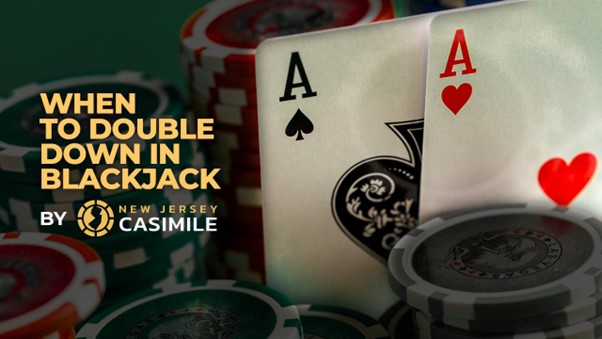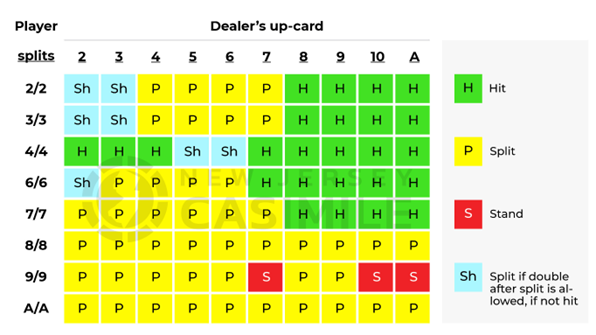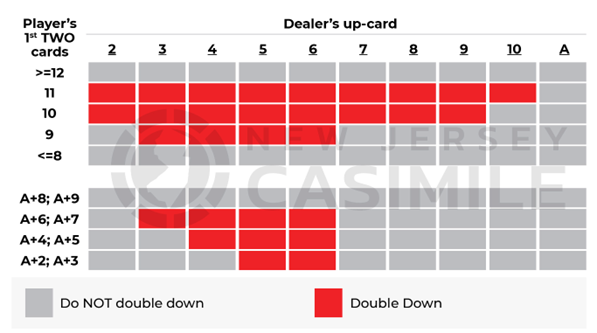
Blackjack is arguably the most popular card game in the world for good reason. The simplistic gameplay is easy to understand, promises excitement, and is profitable if you play right.
Let’s get a closer look at doubling down in blackjack and what are the best instances for this option. This article has gems from our casino experts at nichegamer.com to help improve your winning chances at the table. More information for strategies on the gameplay and online blackjack offers are available at NJCasimile.com for in-depth learning. Now, read this explanatory guide on when to double down in blackjack.
Basic Strategy for Doubling Down and Splitting
When you are considering doubling down in blackjack, basic strategies to improve your gameplay and gaming session are available.
The first thing you need in your gameplay is a strong hand to double down in blackjack. With this in mind, double down with a hand of 9, 10, or 11, and the dealer’s up card is 2 through 9.
Splitting in blackjack is also important. This technique allows players to divide their hand into two, which can improve their chances of winning. You should always split aces and 8s but never split 5s or 10s.
By following these basic strategies for doubling down and splitting, your chances of winning at the blackjack table increase. The question is: can you double down on 21 in blackjack? We will provide you with more strategies in this article.

If you are a visual learner, the blackjack strategy chart above tells when to hit, split, and stand while you play this game. This is a chart for a game of 4–8 decks, where the dealer stands on 17.
Situations Where Doubling Down is Recommended
Knowing when to double down will increase your winnings and minimise your losses. Here are some situations where doubling down is recommended.
When the Dealer is Showing a Weak Upcard
Typically, a dealer’s weak upcard has cards like 2, 3, 4, 5, or 6. This is when you double down in blackjack as a player. This is ideal because your chance of winning is better. It is likely for the dealer to go bust due to their weak hand.
When the Player has a Strong Hand
A total of 10 or 11, and sometimes, 9 counts as a strong hand, presenting a great chance for a blackjack double down. This way, you get a higher chance of making a 10-value card, bagging a total of 20 or 21, a strong hand the dealer may not beat.
When the Player has a Soft Hand
Any blackjack hand that has an Ace is called soft because the Ace can be counted as 1 or 11. When a player has a soft hand and a dealer has a weak upcard, like 4, 5, or 6, it is ideal to double down. You get a strong winning hand by counting the Ace as 11.
In all these situations, players must remember that doubling down is a riskier move compared to hitting or standing. It is best to double down on a confident hand where your odds of bagging a win are high.

This chart shows a basic visual plan for when to double down. It also shows when you should use other strategies like splitting and standing.
Situations Where Doubling Down is Not Recommended
While doubling down is a great winning system in blackjack, there are other situations where it’s best to avoid using this move. Here are some cases when not to double down in blackjack.
When the Dealer is Showing a Strong Upcard
If the dealer’s up card is a 7, 8, 9, 10, or Ace, it is a strong upcard. In this case, it’s best to avoid doubling down, as the dealer may not go bust and will likely have a strong hand. Doubling down may be an unnecessary risk, putting you in a difficult position.
When the Player has a Weak Hand
In blackjack, a total of 8 or lower is a weak hand, and you shouldn’t double down with it. You are unlikely to improve your hand significantly by doubling down, and you may risk losing twice as much money. A better option is to hit and hope for a better card, or to stand, hoping that the dealer goes bust.
When the Player has a Pair
You have a pair if you hold two cards that are the same number in your hand, like two eights or two sixes. It is not a good option to double down in this case. A better plan is to split and play as two hands because doubling down is risky, leaving a weak hand that may be difficult to improve.
Situations Where Splitting is Recommended
An effective plan to improve your chances of winning is splitting pairs in a blackjack game. When you split a pair, your hand becomes two, and you can receive an additional card for each hand, providing you a chance to turn weaker hands into stronger ones, thereby increasing your chances of bagging a win.
When the Player has a Pair of Aces or 8s
In most cases, it is ideal to split a pair of Aces or 8s. By splitting your Aces, there’s a possibility of landing a strong position (two hands with a value of 11). However, splitting your 8s turns a weak hand into two, with each giving you a higher chance of winning.
When the Player has a Pair of 2s, 3s, 6s, or 7s
It is advisable to split a pair of 2s or 3s when the dealer’s up card is a 4, 5, 6, or 7. This, unfortunately, has the dealer in a not-so-strong position where he or she is more likely to bust. Similarly, it’s recommended to split a pair of 6s or 7s when the dealer’s up card is a 2, 3, 4, 5, or 6.
When the Dealer is Showing a Weak Upcard
You should split pairs of 6s, 7s, and 9s if the dealer’s upcard is a 2, 3, 4, 5, or 6. At this point, the dealer is in a weaker position and more likely to bust, so splitting will increase the chances of winning both hands. Similarly, if the dealer’s up card is a 4, 5, or 6, split pairs of Aces and 8s, as these pairs also offer stronger positions.
Situations Where Splitting is Not Recommended
You know that splitting pairs is a valuable strategy when playing. However, some cases do not welcome this strategy. Check them out below.
When the Player has a Pair of 4s, 5s, or 10s
Splitting a pair of 4s can result in two weak hands. On a similar note, pairs of 5s or 10s are strong hands in blackjack and splitting them will lead to weaker hands and decrease your chances of winning.
When the Dealer is Showing a Strong Upcard
If the dealer’s up card is a 7, 8, 9, 10, or Ace, there is no point in splitting pairs as they are in a stronger position and more likely to beat your hand. You will be taking a huge risk, potentially setting yourself up for losses.
Advanced Strategies for Doubling Down and Splitting
Beginners get a solid foundation when they employ basic strategies of improving their blackjack gameplay. If you want to add some kick to your gameplay and improve your chances, there are more advanced strategies that can be employed. Let’s check them out below.
Counting Cards to Determine When to Double Down and Split
Card counting is a well-known technique in blackjack that is often used by advanced players. Using this approach, you track the cards that were dealt during the game and then possibly determine the next cards, showing you the best times to double down or when to split in blackjack.
Adjusting Your Strategy Based on Table Rules
Different tables may have different rules, such as whether doubling down is allowed after splitting, or if surrendering is an option. Advanced players may adjust their blackjack strategy based on the specific rules of the table they’re playing at. It’s important to be aware of the rules and adjust your winning plans to maximise your chances of winning.
FAQ
Can You Double Down After Splitting?
Yes, in most variations of blackjack, players are allowed to double down their cards after splitting a pair. However, it’s important to note that doubling down after splitting can be risky and should only be done in certain situations.
Can You Split a Hand More than Once?
No, usually not, because common blackjack rules require players to split a hand only once during the gameplay. You may find some variants that make allowances, letting you split more than once, so confirm the rules before you place a bet.
Is it Always Better to Double Down or Split When You Have the Opportunity?
Unfortunately, you should not always take the chance if you get the opportunity to use any of these strategies because they can be risky. Always base your decisions on your gameplay and the dealer’s upcard.